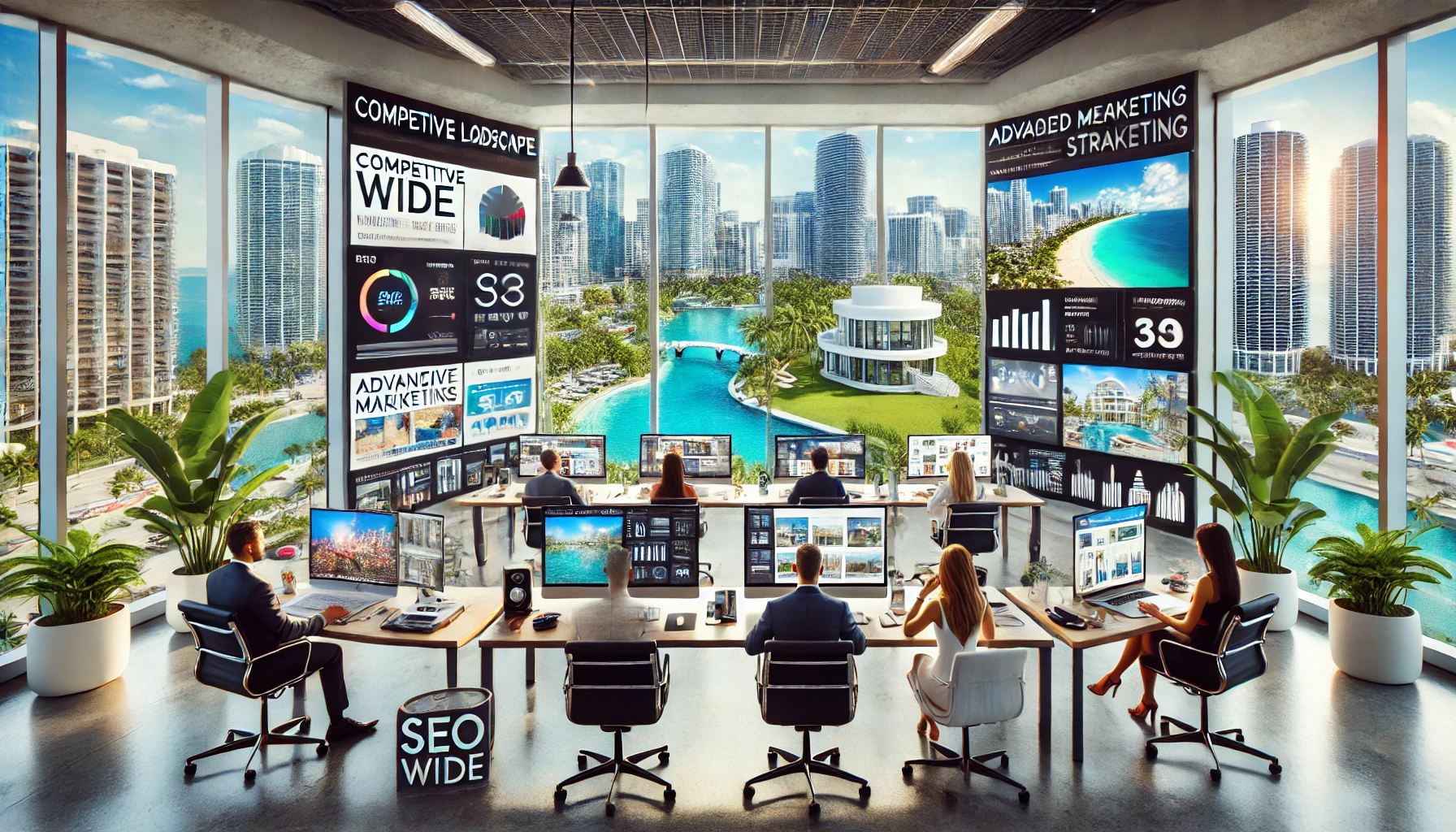The real estate market in Miami, Florida, is highly competitive, characterized by high-value transactions, a diverse client base, and a rapidly evolving landscape. Prestigious real estate firms in Miami employ sophisticated and multifaceted marketing strategies to stand out and attract potential buyers and sellers. This article explores the intricacies of real estate marketing in Miami, highlighting the competitive nature of the industry and providing examples of strategies implemented by leading firms.
The Competitive Landscape of Real Estate Marketing in Miami
Real estate marketing in Miami is fiercely competitive due to several factors:
- High-Value Transactions: Miami’s real estate market includes luxury homes, beachfront properties, and high-rise condominiums, making each transaction highly valuable.
- Diverse Client Base: The market attracts local, national, and international buyers, requiring firms to employ diverse and inclusive marketing strategies.
- Market Saturation: Numerous real estate firms operate in Miami, leading to market saturation and necessitating differentiation.
- Technological Advancements: Firms leverage cutting-edge technologies like virtual reality (VR), augmented reality (AR), and artificial intelligence (AI) to enhance their marketing efforts.
Advanced Marketing Strategies of Prestigious Real Estate Firms in Miami
- Content Marketing and SEOObjective: Attract and engage potential clients by providing valuable content and improving search engine visibility.Strategies:
- Blogging and Articles: Creating high-quality blog posts and articles on topics like Miami market trends, buying tips, and neighborhood guides. These articles are optimized for search engines to improve organic traffic.
- SEO Optimization: Implementing SEO best practices, such as keyword optimization, backlinking, and local SEO, to ensure high visibility in search engine results.
- Video Content: Producing video content, including virtual tours, market updates, and client testimonials, to engage audiences and enhance SEO.
- Social Media MarketingObjective: Reach and engage with a broad audience through social media platforms, building brand awareness and generating leads.Strategies:
- Platform Utilization: Leveraging platforms like Instagram, Facebook, LinkedIn, and Twitter to share property listings, market insights, and success stories.
- Influencer Partnerships: Collaborating with influencers and industry experts to expand reach and credibility.
- Interactive Content: Using interactive content such as polls, Q&A sessions, and live virtual tours to engage followers.
- Virtual Reality and Augmented RealityObjective: Provide immersive experiences to potential buyers, allowing them to explore properties remotely.Strategies:
- Virtual Tours: Offering 3D virtual tours of properties using VR technology, allowing clients to explore homes in detail from the comfort of their own homes.
- AR Applications: Developing AR applications that enable clients to visualize renovations, interior design changes, or how their furniture would look in a new home.
- Data-Driven MarketingObjective: Use data analytics to inform marketing decisions, personalize client interactions, and optimize campaign performance.Strategies:
- CRM Systems: Implementing sophisticated CRM systems like Salesforce to manage client relationships, track interactions, and personalize communications.
- Predictive Analytics: Using predictive analytics to identify potential buyers and sellers, forecast market trends, and tailor marketing strategies accordingly.
- Behavioral Targeting: Employing behavioral targeting to deliver personalized ads based on user behavior and preferences.
- Email Marketing CampaignsObjective: Nurture leads and maintain ongoing communication with clients through targeted and personalized email campaigns.Strategies:
- Segmentation: Segmenting email lists based on criteria such as location, buying intent, and previous interactions to deliver highly relevant content.
- Automated Drip Campaigns: Implementing automated drip campaigns to send a series of personalized emails over time, nurturing leads through the sales funnel.
- Interactive Elements: Incorporating interactive elements like videos, polls, and virtual tour links to increase engagement.
- High-Quality Visual ContentObjective: Capture attention and showcase properties effectively through stunning visual content.Strategies:
- Professional Photography: Investing in professional photography to capture high-quality images of properties, highlighting their best features.
- Drone Footage: Using drone photography and videography to provide unique aerial views of properties and surrounding areas.
- Virtual Staging: Employing virtual staging to digitally furnish and decorate vacant homes, helping potential buyers envision the space.
Conclusion
Real estate marketing in Miami is highly competitive, with prestigious firms employing advanced and multifaceted strategies to differentiate themselves and attract clients. By leveraging content marketing, social media, VR and AR technologies, data-driven approaches, email campaigns, and high-quality visual content, these firms create engaging and effective marketing campaigns. Companies like The Jills Zeder Group, ONE Sotheby’s International Realty, EWM Realty International, Douglas Elliman Real Estate, Coldwell Banker Residential Real Estate, and Compass Miami exemplify how innovative marketing strategies can drive success in the Miami real estate market.
